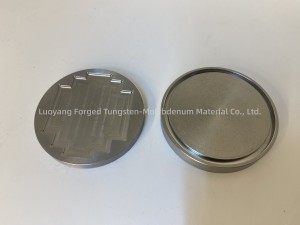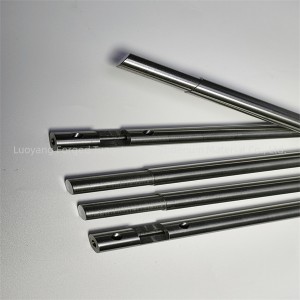Mo-La alloy sheet
Lanthanum has several important uses, including:
1. Catalyst: Lanthanum compounds are used as catalysts in the petroleum refining industry and the production of synthetic hydrocarbon fuels.
2. Glass and ceramics: Lanthanum oxide is used to produce high-quality optical glasses and ceramics.
3. Batteries: Lanthanum is used in nickel metal hydride (NiMH) batteries, often used in hybrid and electric vehicles.
4. Carbon lighting: Lanthanum is used in carbon arc lighting and in the film industry for studio lighting and projector lights.
5. Magnets: Lanthanum is used to produce powerful permanent magnets, especially in applications such as headphones and speakers.
6. Alloys: Lanthanum is used as an alloying element in various metals to improve their properties, such as in the production of ductile iron.
These are just a few examples of the many applications of lanthanum in various industries.

Lanthanum possesses several unique properties that make it special and valuable for a variety of industrial and technological applications:
1. Ductility and Malleability: Lanthanum is a soft, malleable and malleable metal, making it suitable for molding and forming into a variety of products and components.
2. Catalyst performance: Lanthanum compounds exhibit excellent catalytic properties, making them of great value in processes such as petroleum refining and synthetic hydrocarbon fuel production.
3. Optical properties: Because lanthanum can enhance the refractive index and optical properties of glass, it is used to produce high-quality optical glasses and lenses.
4. Magnetism: Lanthanum is used to produce powerful permanent magnets, aiding in their use in applications such as headphones and speakers.
5. Battery technology: Lanthanum is used in nickel metal hydride (NiMH) batteries, often used in hybrid and electric vehicles, to help advance sustainable energy storage.
These unique properties make lanthanum a versatile and valuable element in industries ranging from electronics and energy storage to optics and catalysis.

Lanthanum metal itself is not considered highly reactive or corrosive under normal conditions. Does not react with water or oxygen at room temperature. However, like many other metals, lanthanum can react with acids and other corrosive substances under certain conditions. Lanthanum compounds, on the other hand, can exhibit different chemical properties and may be reactive and corrosive to varying degrees, depending on their specific composition and the environment in which they are used. Therefore, it is important to consider the specific form and environment in which lanthanum is used when assessing its corrosion potential.

Lanthanum metal itself is not flammable under normal conditions. It will not spontaneously ignite in air and does not react with water at room temperature. However, when lanthanum is finely divided or in powder form, it can cause a fire if exposed to an ignition source. Additionally, lanthanum compounds may have varying flammability depending on their specific chemical composition.
Therefore, while lanthanum metal is not generally considered flammable, appropriate precautions should be taken when handling lanthanum in any form to prevent potential fire hazards.
Wechat:15138768150
WhatsApp: +86 15236256690
E-mail : jiajia@forgedmoly.com










